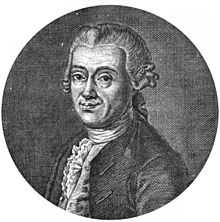Johann Daniel Titius
| Johann Daniel Titius | |
|---|---|
 Johann Daniel Titius | |
| Born |
January 2, 1729 Chojnice, Royal Prussia, Poland |
| Died |
December 11, 1796 (aged 67) Wittenberg |
| Fields | astronomy |
| Known for | Titius–Bode law |
Johann Daniel Titius (January 2, 1729 – December 11, 1796) was a German astronomer and a professor at Wittenberg.
Titius was born in Chojnice, Polish Royal Prussia, and died in Wittenberg. His original name was Johann Dietz, but as was customary in the 18th century, when he became a university professor, he Latinized his surname to Titius.
He is best known for formulating the Titius–Bode law, and for using this rule to predict the existence of a celestial object at 2.8 AU from the sun. This happened in 1766, when he inserted his observation on planetary distances into a German translation of Charles Bonnet's book Contemplation de la Nature. His suggestion that the object would necessarily be small was later superseded by the claim of Johann Elert Bode for a planet-like object, subsequently identified as being Ceres. In part because of the Titius-Bode law, the first four minor planets were at first labeled full-fledged planets. After a fifteen-year hiatus, other minor planets started to be discovered at steadily increasing rates, and Ceres and company were eventually relabeled "minor planets" or "asteroids". Because of its spherical shape, Ceres was reclassified as a dwarf planet in 2006.
The asteroid 1998 Titius and the crater Titius on the Moon are named in his honour.
References
- ↑ Michael Nieto (1972). The Titius–Bode Law of Planetary Distances. Pergamon Press.
- ↑ Clifford J. Cunningham (1988). Introduction to Asteroids. Richmond, Virginia: Willmann-Bell Inc.
- ↑ "Author Query for 'Titius'". International Plant Names Index.
External links
- KDG Wittenberg: Prof. Dr. Joh. Daniel Titius
- Plants and Planets: The Law of Titius-Bode explained by H.J.R. Perdijk
- "Johann Daniel Titius", Allgemeine Deutsche Biographie (ADB) (in German) 38, Leipzig: Duncker & Humblot, 1894, pp. 380–
|